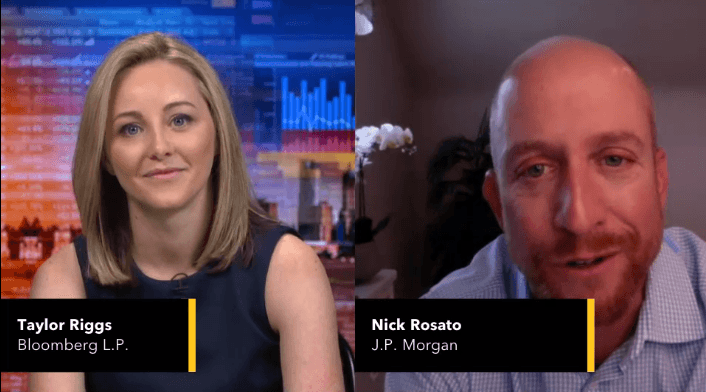As they start their careers, entry-level analysts have ambitions to grow and learn as much as possible, while distinguishing themselves for future opportunities. There are a variety of ways in which this can happen, and research can be an especially fruitful path, providing a strong foundation and potential for growth in multiple areas.
In a recent Bloomberg-sponsored conversation, Nicholas Rosato, Managing Director and Head of North American Equity Research at J.P. Morgan, shares his own experience in equity research, lessons he’s learned, and advice he has for those at the start of their career journeys

Invest in skill building
When asked to define what’s fueled his career success, Rosato sees his trajectory, starting at Prudential with a stint at Bear Stearns and now at J.P. Morgan, as clearly linked to his love of markets and analyzing stocks. He attributes this enthusiasm and desire to learn among the most important factors in his career. “Everything I did, whether it was studying finance in school or making career moves, was to further that,” he said. “While I was making conscious decisions to move forward, and had some help with luck and timing, I worked hard through it all because I really loved what I did. Whether it was selling research, marketing, or managing it, I’ve always had a passion for it. So, I put in the work and developed the skills I needed to be successful.”
Rosato described what he sees as the basic skills required for equity research – someone starting out will need to understand financial markets and corporate structure. “Beyond that, you need to be a great communicator, a great writer” he said. “These are things that aren’t always a given. Some of these skills can be taught, but they all come together to make a great analyst. When I think about people I’ve met over the years, there’s no “one size fits all” list of traits, but everyone possesses the desire to succeed and work hard. These skill sets ultimately become an incredible foundation for a variety of careers. Equity research offers a great career, or can be a very effective training ground.”
Such fundamentals are also key in understanding and working within rapidly changing markets. The rise of ESG and changing regulation, as well as the volatility created by GameStop and other meme stocks, are just a few of the factors currently altering the research landscape. Computer science/coding skills have also been an important development in considering new hires, given the pace of technology. “We’ve seen a lot of college graduates in the past three to five years come in with programming skills, and it’s been unbelievably helpful for my department,” Rosato said. “As we’re teaching them equity research, they’ll notice something and build a program to simplify it. It’s saved so much time and allowed us to automate some of our processes.”
Of course, idea generation is a crucial component for any successful analyst. “It’s core to what we do,” Rosato said. Below are some key questions analysts should consider:
- Financial analysis: “Where do your ideas and assumptions differ from the Street? How can you make a call, based on that?”
- Fundamental research and field work: “Where are the shifts, in technology or product cycle or whatever it might be? When you see something that looks differentiated, that creates an idea.”
- Dislocation & valuation: “This can be a top-down view. What do you see as noteworthy or standing out?”
Become an expert communicator
Like all financial businesses, research has been upended and changed by the global pandemic. Equity research lends itself to remote work, which gave analysts more time to evaluate the market volatility that came with the pandemic. However, all of this has come with the cost of losing personal connections and relationships. “The one thing we all know we’re missing is the interpersonal communication,” Rosato said. “Being able to ask for help, meeting partners in sales and trading, and learning about best practices are all much more seamless in the office.” Until in-person work is possible again, Rosato is encouraging more communication, skip-level meetings, and more informal gatherings to keep analysts learning and engaged.
When considering the future of equity research, the business is seen as arguably shrinking with the rise of quants and ETFs , but Rosato says that demands on analysts’ time was up 35% in 2020, given volatility surrounding the pandemic and increased deal activity. “To me, the demise of equity research is greatly over exaggerated,” said Rosato. “It remains a critical function within the investment bank.”
Getting noticed
When marketing research, how does an analyst set him or herself apart? Below are Rosato’s takeaways for progressing and succeeding within research:
- Aside from coming up with a thesis, hypothesis, and recommendation, it’s important to lead with your conclusion (without being too flashy) and let the reader know what’s differentiated in your research. It’s also important to consider internal stakeholders, as well as external.
- When looking to move up to lead analyst coverage, it’s important to notice, who’s going above and beyond? Who’s producing great work? Those analysts start with a leg up in evaluation for those positions, as Rosato aims to hire internally.
- Build relationships with clients, and within the firm. Do everything you can to talk to Sales, be helpful, keep dialogues open with senior analysts, and go to events.
- Take initiative and look for opportunities to network. This extends to making use of different tools and resources available at your company. “Take advantage of trainings,” Rosato said, “and use them as an opportunity to differentiate yourself.”